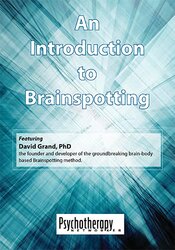

Symptoms of unprocessed trauma—including dissociation, numbing, and chronic anxiety—are notoriously difficult to eliminate through talk therapy. The reason: the overwhelmed brain is unable to process verbal information about the events. But Brainspotting, a brain-based method for clearing trauma blockage without clients having to talk about it, nurtures the capacity for natural self-healing.
| File type | File name | Number of pages | |
|---|---|---|---|
| Manual - An Introduction to Brainspotting (914.7 KB) | 23 Pages | Available after Purchase |

David Grand, PhD, is a psychotherapist, writer, lecturer, performance coach, and humanitarian famous for the discovery and development of the internationally acclaimed Brainspotting method, which brings about life-changing breakthroughs at "Warp Speed." Dr. Grand is a Licensed Clinical Social Worker with a PhD from International University, and is renowned for his groundbreaking discoveries and advancements in the arenas of healing trauma and enhancing performance and creativity. His Brainspotting method and BioLateral Sound are now used by thousands of therapist on every continent seeking to break through the limitations of talk therapy. Dr. Grand is the author of Brainspotting: The Revolutionary New Therapy for Rapid and Effective Change.
Speaker Disclosures:
Financial: Dr. David Grand maintains a private practice and is a developer for BioLateral Sound Recordings. He is the developer of the Brainspotting method and receives compensation as a national lecturer. Dr. Grand receives a speaking honorarium and recording royalties from Psychotherapy Networker and PESI, Inc. He has no relevant financial relationships with ineligible organizations.
Non-financial: Dr. David Grand has no relevant non-financial relationships.
Please wait ...